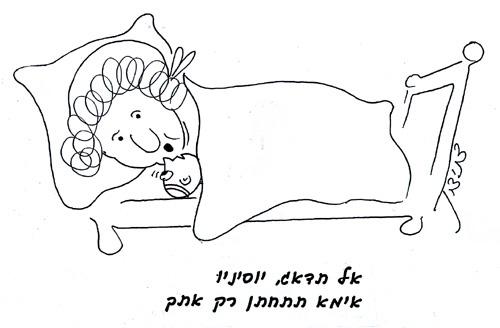
A cohen is forbidden to marry a woman who had sexual relations with a man forbidden to her, for thus did Chazal interpret the word defiled woman, written in the Torah: “He [the cohen] shall not take a wife who is a harlot or a defiled woman” (Leviticus 21:7). For example, a woman is forbidden to have sexual relations with her own son, and if she did have such relations despite the prohibition, she is defiled and a cohen is forbidden to marry her. The study halls of Shammai and of Hillel disagreed on the case of a mother who had sexual relations with a son aged between 8 and 9. Why was this the specific cause of disagreement? If the son were over the age of nine, intercourse with him are considered sexual relations and therefore the mother is forbidden to marry a cohen. If the son were under the age of eight, intercourse with him is not considered sexual relations and therefore the mother, though she had intercourse with him, is permitted to marry a cohen. What explanation is there for the disagreement between the study halls of Shammai and of Hillel about a boy between the ages of eight and nine? The scholars explained it: In earlier generations a boy could impregnate a woman from the age of eight, while in the time of the study halls of Shammai and Hillel boys could only impregnate women from the age of nine. The study hall of Shammai thought that the deciding age was that of earlier generations (8) while the study hall of Hillel thought that the deciding age was the current age (9). How did they know that in earlier generations a boy could get a woman pregnant from the age of eight? Answer: Batsheva was the granddaughter of Achitophel. Achitophel, according to the sages, died at the age of 33 and at the time of his death Solomon, the son of Batsheva, was already 7. That means that when Solomon (Achitophel’s great-grandson) was born, Achitophel (Solomon’s great-grandfather) was only 26 years old. Since there were three births and three pregnancies whose total time lapse is two years, that means that over the course of 24 years three generations were born. This shows us that Achitophel impregnated his wife when he was only 8. The scholars rejected this proof, arguing that it was possible Achitophel was 9 when he impregnated his wife and that Batsheva was 6 when she became pregnant, for women tend to get pregnant at a younger age than that at which men can impregnate a woman. The scholars try to bring a different proof that in earlier generations a boy of 8 could impregnate a woman. The sages determined that Abraham was two years older than his brother Haran, and Abraham married his niece, the daughter of his brother Haran (the sages determined that Yiskah, the daughter of Haran, was actually Sarah). Abraham was ten years older than Sarah and two years older than her father (Haran). Therefore, the difference in age between Haran and his daughter Sarah was only eight years. This means that he impregnated his wife at the age of eight. The scholars rejected this proof with the argument that perhaps Abraham was really younger than his brother Haran, and not older as was claimed above. Finally the scholars brought proof that a child of 8 could once have impregnated a woman from Betzalel, who was the great-grandson of Calev the son of Yifuneh. Betzalel, according to the sages, was 14 when his great-grandfather (Calev) was only 40. When Betzalel, the great-grandchild of Calev, was born, Calev was only 26. Take into account the length of three pregnancies and births, which is two years, and we find that over the course of 24 years three generations were born, with each father being 8 years old when he impregnated his wife.
(Babylonian Talmud, Tractate Sanhedrin 69b)
